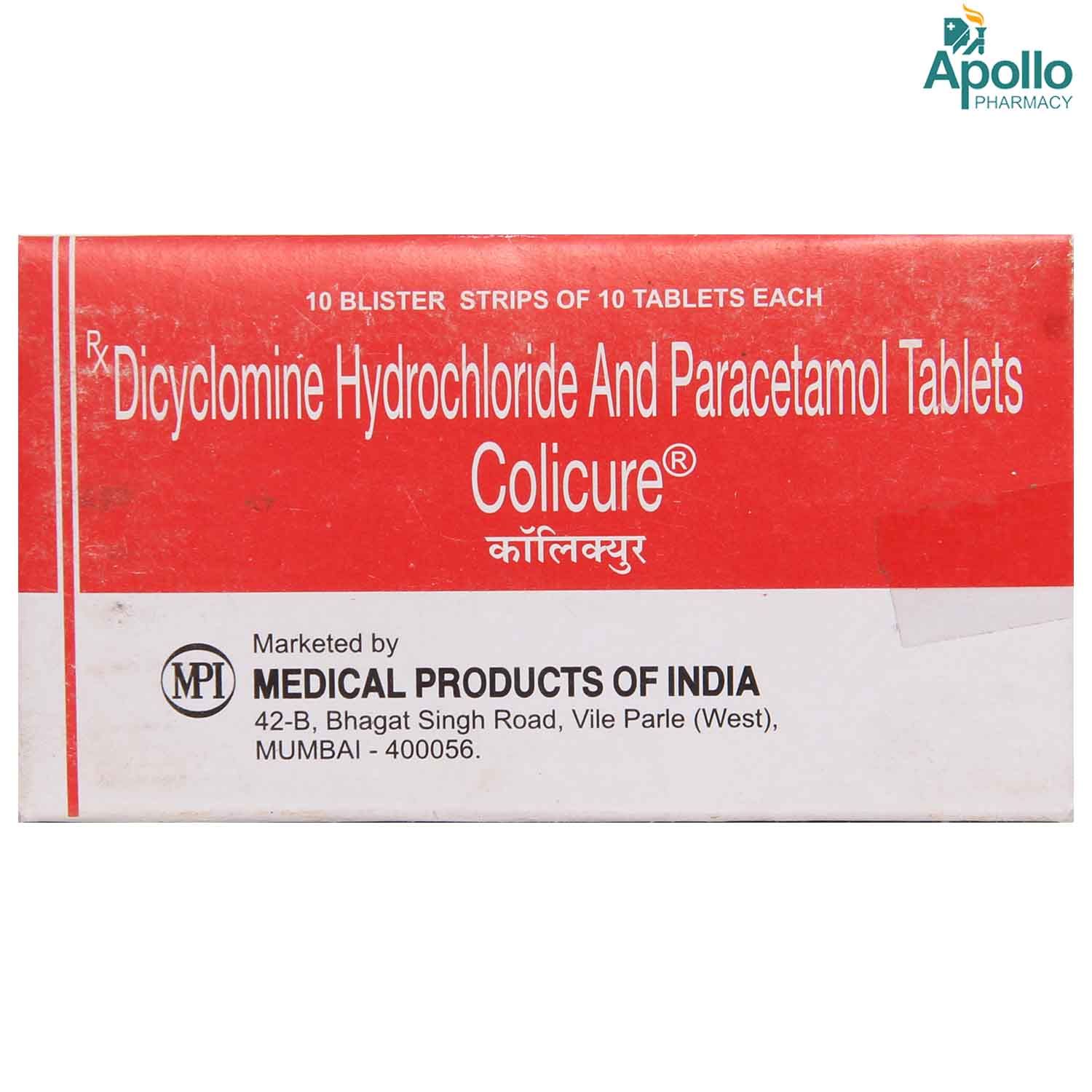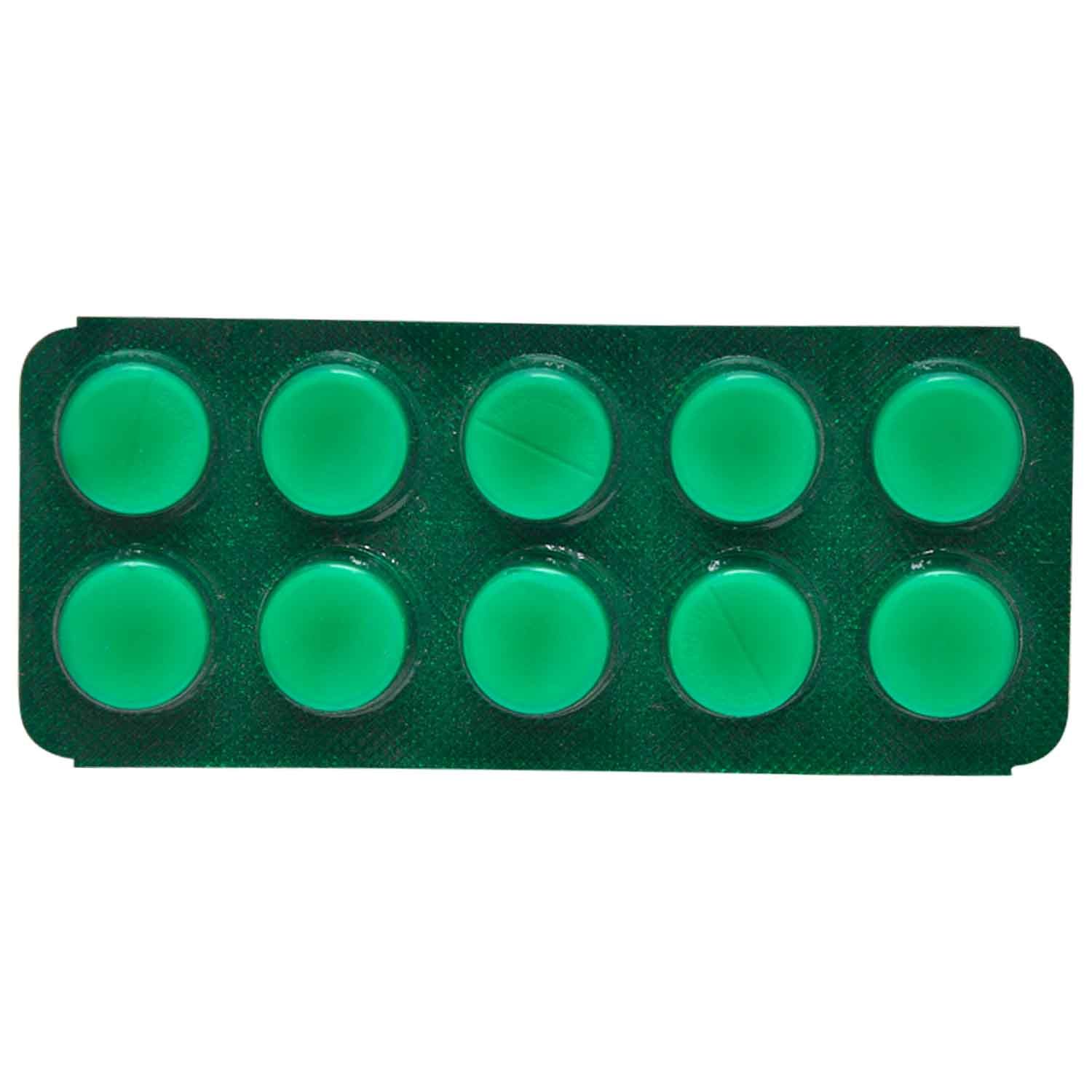Dicyclomine+paracetamol
About Dicyclomine+paracetamol
Dicyclomine+paracetamol is used in the treatment of spasmodic pain and discomfort due to biliary colic, intestinal colic, renal colic and spasmodic dysmenorrhea (painful, irregular periods). It also helps alleviate the symptoms of irritable bowel syndrome (IBS). Colic is the intensive and uncontrollable crying in babies for a prolonged period for no certain reason. Dysmenorrhea (Abdominal cramps) is an unpleasant sensory and emotional experience associated with irregular periods. It occurs just before or during menses. Irritable bowel syndrome is an intestinal disorder that causes stomach pain, wind, constipation, and diarrhoea.
Dicyclomine+paracetamol is composed of two medicines: Dicyclomine (antispasmodic/anticholinergic agent) and Paracetamol (analgesic). Dicyclomine/Dicycloverine helps in blocking the activity of certain natural substances that are responsible for causing pain. Paracetamol has both analgesic (pain reducer) and antipyretic (fever reducer) properties, which also decrease inflammation.
Your doctor will decide the dose and duration based on the severity of your pain. Common side effects of Dicyclomine+paracetamol include experiencing dizziness, nausea (feeling sick), digestion problems like constipation, flatulence, diarrhoea, and skin reactions like rashes and hives. Most of the side effects of Dicyclomine+paracetamol do not require medical attention and gradually resolve over time. However, if the side effects are persistent, reach out to your doctor.
Let your doctor know if you are sensitive or allergic to Dicyclomine+paracetamol or any other medications. Before using Dicyclomine+paracetamol, let your doctor know if you have liver, kidney or heart diseases and any other medical history. Some antacids may inhibit the absorption of Dicyclomine+paracetamol, hence consult your doctor. Dicyclomine+paracetamol may cause dizziness; hence, do not drive or operate machinery until you feel better. Pregnant and breastfeeding women should consult their doctor before using Dicyclomine+paracetamol. Dicyclomine+paracetamol should be used in children only when recommended by a doctor.
Uses of Dicyclomine+paracetamol
Medicinal Benefits
Dicyclomine+paracetamol is composed of two medicines: Dicyclomine (antispasmodic) and Paracetamol (mild analgesic and fever reducer). Dicyclomine+paracetamol helps relieve spasmodic pain and discomfort due to biliary colic, intestinal colic, renal colic, and spasmodic dysmenorrhea (painful irregular menses/periods). Dicyclomine helps in blocking the activity of certain natural substances in the body responsible for causing pain. On the other hand, Paracetamol has analgesic (pain reducer) and antipyretic (fever reducer) properties, decreasing inflammation. Together, they effectively reduce pain and inflammation in conditions of intestine inflammation, spasms and painful menstruation.
Directions for Use
Storage
Side Effects of Dicyclomine+paracetamol
Dizziness
Nausea (feeling sick)
Constipation
Flatulence
Diarrhoea
Rashes/hives
Drug Warnings
Let your doctor know if you are sensitive to Dicyclomine+paracetamol or its components. Dicyclomine+paracetamol should be used with caution and only under a doctor’s supervision if you have stomach/intestinal problems and diarrhoea due to intestine surgeries like ileostomy and colostomy. Pregnant and breastfeeding women should use Dicyclomine+paracetamol with proper consultation and caution. Dicyclomine+paracetamol may cause blurry vision and dizziness affecting your mental focus, hence do not drive or operate machinery until you feel better. Drinking alcohol may worsen the side effects; therefore, it is advised to avoid the alcohol intake while using Dicyclomine+paracetamol. Dicyclomine+paracetamol should be used in children only when prescribed by the doctor.
Drug Interactions
Drug-Drug Interaction: Dicyclomine+paracetamol may interact with cholesterol-lowering drugs (cholestyramine), vomiting medicines (domperidone), anti-HIV drugs (zidovudine), blood thinners (warfarin), corticosteroids, blood pressure-lowering medicines, drugs to lower organ rejection (tacrolimus), anti-cancer or anti-arthritis drugs (methotrexate), urinary alkalinizer (potassium citrate), and potassium supplements.
Drug-Food Interaction: Intake of alcohol should be avoided while taking Dicyclomine+paracetamol.
Drug-Disease Interaction: Patients affected with liver disease, bleeding disorder, urinary tract infection (UTI), myasthenia gravis, high blood pressure, and alcoholism should seek medical advice before starting Dicyclomine+paracetamol.
Drug-Drug Interactions Checker List:
Safety Advice

Alcohol
cautionIt is advised to limit alcohol intake to prevent any undesirable side effects of Dicyclomine+paracetamol and further worsen your disease. Please consult your doctor before using Dicyclomine+paracetamol.

Pregnancy
cautionDicyclomine+paracetamol should be used during pregnancy only if potential benefit over weigh potential risk to fetus.

Breast Feeding
cautionPlease seek medical advice if you are a breastfeeding mother before starting Dicyclomine+paracetamol.

Driving
cautionDicyclomine+paracetamol may cause dizziness, drowsiness, and visual disturbances, which may affect their ability to drive or operate machinery. Make sure you are not affected before driving or operating machinery.

Liver
cautionDicyclomine+paracetamol to be taken with caution if you have a history of Liver diseases/conditions. The dose may have to be adjusted by your doctor.

Kidney
cautionDicyclomine+paracetamol to be taken with caution if you have a history of Kidney diseases/conditions. The dose may have to be adjusted by your doctor.

Children
cautionPediatric drops/oral liquid are not recommended in children unless prescribed by a doctor. The doctor will decide the dose and duration based on your child’s age and medical condition.
Habit Forming
Diet & Lifestyle Advise
Avoid or limit the intake of alcohol and caffeine.
Manage stress, eat healthily, drink plenty of water, exercise regularly, and get plenty of sleep.
Limit taking high fibre foods, foods and drinks that contain chocolate, alcohol, caffeine, fructose, or sorbitol, carbonated drinks, fried, and fatty foods.
Do not have large meals at a time, instead try having small and simpler meals at regular intervals, including fresh fruits and vegetables in your diet.
Practice yoga and recreation techniques to manage your emotional stress.
If you are lactose intolerant, avoid using dairy products since it can worsen your IBS.
If you cannot take dairy products, it is advised to include other calcium-rich foods like leafy greens, beans, nuts, and seeds.
Drink plenty of fluids and dress lightly to prevent heatstroke and dehydration.
Avoid overly sweating activities like hard exercises and using hot tubs.
Patients Concern
Disease/Condition Glossary
Colic: Colic is the intensive and uncontrollable crying in babies for a prolonged period for no certain reason. Colicky babies usually have distended bellies, release gas, raise their legs to the chest, and bend or arch their backs.
Irritable Bowel Syndrome (IBS): It is also termed as IBS colitis, mucous colitis, spastic colon, nervous colon, and spastic bowel. It is an inflammatory bowel disease that affects the large intestine. Symptoms of an IBS include abdominal pain, bloating, diarrhoea, mucus in stools, wind, constipation, tiredness, anxiety, depression, heartburn, indigestion, and headaches.
Dysmenorrhea refers to abdominal cramps/pain and an unpleasant sensory/emotional experience associated with irregular periods. It occurs just before or during menses.
FAQs
Dicyclomine+paracetamol is used in the treatment of spasmodic pain and discomfort due to biliary colic, intestinal colic, renal colic and spasmodic dysmenorrhea (painful, irregular periods). It also helps alleviate the symptoms of irritable bowel syndrome (IBS).Â
Dicyclomine+paracetamol works by relaxing the muscles and inhibiting natural gut movements, thereby relieving muscle spasms and cramps in the stomach and intestine, abdominal pain, constipation and other GI discomforts.
Antacids may lower the absorption of Dicyclomine+paracetamol and reduce its efficacy. It is advised to take antacid and Dicyclomine+paracetamol at different times. If you take antacid after meals, please take Dicyclomine+paracetamol before meals.
If you suffer from IBS, limit taking high fibre foods, foods and drinks that contain chocolate, alcohol, caffeine, fructose, or sorbitol, carbonated drinks, fried, and fatty foods. Do not have large meals; instead, try having small and simpler meals at regular intervals, including fresh fruits and vegetables in your diet.
The use of Dicyclomine+paracetamol can cause diarrhea in some cases. In the case of diarrhea, increase the intake of fluids like drink plenty of water. If still diarrhea persists, inform your doctor and do as advised.
Yes, the use of Dicyclomine+paracetamol can cause dry mouth. If you feel excessively thirsty, increase fluid intake, and avoid spicy and salty food.
Limited research available. Please discuss with your doctor if you have any concerns regarding this.
Yes, alcohol consumption may increase symptoms of GERD and cause damage to the esophageal mucosa.
Smoking causes several common digestive system ailments, including heartburn and gastroesophageal reflux disease (GERD), peptic ulcers, and various liver diseases.
Dicyclomine+paracetamol is usually safe to use in the dose as recommended by the doctor.
There are no known reported contraindications with Dicyclomine+paracetamol when administered in recommended doses. However, Dicyclomine+paracetamol is considered harmful for patients with known allergies to any of the components or excipients of this medicine.
It is best to take Dicyclomine+paracetamol after meals. Swallow it as whole with water. Do not open, chew or crush it. Follow your doctor’s instructions carefully.
Dicyclomine+paracetamol may cause a fast or irregular heartbeat or palpitations, which may worsen some symptoms of these conditions. Please seek medical attention if you face any issues.
Store in a cool and dry place away from sunlight. Keep Dicyclomine+paracetamol out of the sight and reach of children.
Before using this medication, you should inform your doctor about your medical history, including any ongoing medicines, to avoid potential interactions and minimise side effects.
Taking more than the recommended dosage does not provide additional relief and can increase the risk of adverse effects.







